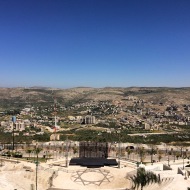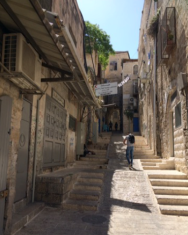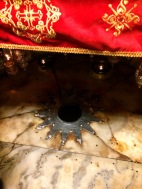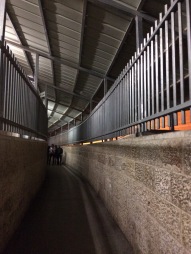8 Open Education in Palestine: A Tool for Liberation
Javiera Atenas
Last week I had the opportunity to travel to Palestine, to the West Bank to visit our OpenMed partners for the Palestine OER strategy Forum. Palestine, as land, is not always available in the modern maps, because if you search for it in Google Maps, you can see the West Bank and Gaza, but its name, State of Palestine it has been simply wiped out from today’s most popular cartographic search engine. So due to it’s political history, this Open Education trip has let me thinking about what I am doing, and why….
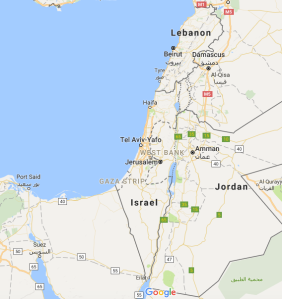
Our trip started in Ramallah, a beautiful and vibrant city, where you can see the Mediterranean sea from distance, but if you were born there, and you don’t have the right credentials, you don’t hold the right to get there, so you can only see the sea from the top the city, but you are separated from it because there is a wall.
The realities of these countries are diverse, as such is their culture, therefore access to material goods and to decent life standards are subject to the oppression of neoliberalism, capitalism, and predatory economic models which affect the access to basic human rights, proper education, a good and strong health system, an income that allows you to feed your loved ones without having to work in infra-human conditions.
When we do Open (Education, Data, Government, Science and Access) we need to consider that certain rules are better skipped, in the case of Open Education there is a tendency that does not exist in other Open fields, which is to consider Open just what is under the 5 Rs, therefore OER tends to mean resources are openly licensed and follow OE rules as if this was a dogma, but Open means to me, able to share your content, to detach your research from predatory – corporate publishers and to ignore for example the University Rankings, because their metrics are in a system that may not be helping to achieve success under each region or countries our own terms, because the rules are white and Anglo-Saxon, and each country and region tend to play at other rhythms, and ways of work.
Opening up means to me to share, to do things in a transparent way, to collaborate, to support and to provide the tools for educators and students to be critical thinkers, to challenge and to question, to become communities and not to follow a rule that tells you if you are open enough according to someone else’s agenda, so just be open, under your own terms, share, distribute, communicate, participate, engage, thinking that before Open rules there are human rights, and that accessing quality education is one of these.

PS1: Thanks to Birzeit University and An Najah Universities for the invitation, specially to Rania, Rula and Saida, you are very inspiring women, also to Abdellatif and Marwan, this event has been by far the most inspiring I have ever attended.
PS2: Thanks to Cristina, Fabio,Daniel, Isidro, Katherine, Sarah, Javier, Antonio and to the rest of the OpenMed team, you people are amazing.
PS3: Any typos, blame the minions, they are not good at grammar because they don’t like to go to school.
PS4: All the pictures are CCBYNC, I took them so I do what I want with them.
PS5: This is my personal perspective and are my views and may not represent the views of my employers, that’s why I’m using my personal blog to post it.
About the Author
Information Scientist with a PhD in Education. Working in Open Data, Open Education and Policies. Co-coordinator of the Open Education Working Group, Education lead at the Latin American Initiative for Open Data and Associated Researcher at the Universitat de Barcelona.
Attribution







